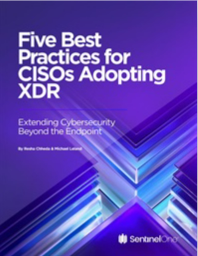5 Best Practices for CISOs Adopting XDR
The pace of change in IT infrastructures is unyielding. With XDR, cybersecurity teams can keep up, improve threat protection, increase SOC productivity, and lower ownership costs. Older technologies, such as SIEM, aimed to provide improved protection, better detection capabilities, greater productivity, and lower ownership costs, but have fallen short over the years. What SIEM couldn't do, XDR can. Learn 5 best practices that all CISOs and security experts should consider when implementing XDR. Read this whitepaper to learn more about:
Read More
By submitting this form you agree to Sentinel One contacting you with marketing-related emails or by telephone. You may unsubscribe at any time. Sentinel One web sites and communications are subject to their Privacy Notice.
By requesting this resource you agree to our terms of use. All data is protected by our Privacy Notice. If you have any further questions please email dataprotection@techpublishhub.com
Related Categories: AIM, Analytics, Applications, Cloud, Compliance, Connectivity, Email, ERP, Event Management, Hybrid Cloud, IT Infrastructure, Log Management, Machine Learning, Malware, Network, SaaS, Security Solutions, Server, Software, Storage


More resources from Sentinel One

7 Common Ways Ransomware Can Infect Your Orga...
Understanding how ransomware infects a device and spreads across a network is crucial to ensuring that your organization doesn't become the next vi...

MITRE Engenuity™ ATTandCK® Evaluation
MITRE has become the common language of EDR and is the de facto way to evaluate a product's ability to provide actionable information to the SOC. T...

5 Best Practices for CISOs Adopting XDR
The pace of change in IT infrastructures is unyielding. With XDR, cybersecurity teams can keep up, improve threat protection, increase SOC producti...